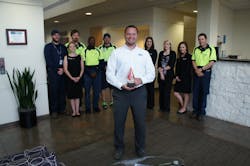Ground Support Worldwide’s 2016 Team Leader of the Year: Jonathan Bluth
“I struck lucky.”
To hear him tell it, Jonathan Bluth, operations manager at Atlantic Aviation’s Austin, Texas location, is the luckiest man alive. Bluth took a job as a line service technician at a South Bend, Indiana FBO near where he grew up after growing up with a fascination of airplanes that was aided by the internet boom and enthusiast forums,.
Atlantic purchased the small FBO Bluth had been working at as part of their acquisition of Mercury Air Center in 2007 and Bluth came with.
“I’ve learned a lot along the way,” Bluth says. “And I can’t imagine myself without all these airplanes.”
After becoming a site trainer for Atlantic, Bluth’s rise took off. He moved to Austin to oversee the ramp as line manager at Austin-Bergstrom International Airport in 2012 and became the operations manager at the same location just last year and now leads a team of 26 people.
“His leadership guided us through the Formula One races and the annual SXSW Music, Movies and Technology Festival and Conferences, two of the busiest times of the year here in Austin, Texas,” Joe Daniel, a line service technician and member of Bluth’s team, said in his nomination of Bluth. “He’s achieved a true team environment at Austin Atlantic.”
Leadership
Bluth is certainly young for someone in his role at 33-years-old, but the growth he’s taken on in 13 years on the ramp has encouraged Atlantic management.
“It has been really neat to see somebody become the leader that he has grown into,” Brice Allen, general manager of Atlantic Aviation Austin, says. “He has evolved to the operations manager of a tier-one base, which is what we call one of the larger bases.”
According to Bluth, the safety aspect is his most important job and his main responsibility is to keep his team well-equipped to succeed by giving them the tools they need to stay safe in an environment as physically demanding and dynamic as the ramp.
“I think when we're just employees, we start to think about ourselves, and when we become leaders we start to think about others,” Allen says. “To see him come here as a young man who was engaged, and then to have a child and become married and get a home. That all became a part of who he is, with how he started seeing and dealing with his staff and his employees, and understanding how important everything is to taking care of the people who work underneath you.”
Daniel, in his nomination of Bluth, cited the major equipment improvements that Bluth has made in his first year as operations manager. Daniel wrote that Bluth provided two refuelers, new GSE tires, a drivable GPU, tool updates and oversaw both hangar renovations and line shack improvements.
“We coordinate with a lot of the other sister locations that are nearby, so I worked with Houston this year, got an additional fuel truck moved over,” Bluth says. “We'll babysit that, take care of all the quality control while it's under our care, and then we'll return it to them when they're ready to have it back.”
In addition, Atlantic Austin took in a number of GSE pieces from various California locations as carbon regulations have pushed them out of service on the West Coast. With a not-insignificant amount of maintenance and updating, suddenly the Austin location has what’s essentially a brand new piece of GSE.
“Unfortunately they sit for extended periods because of those regulations, and that sea air really does a number on them,” Bluth says. “We've really worked hard at the appearance, and to bring that equipment up to standard and really function well to support these guys because Lord knows they can't do their job if they don't have the equipment there for them.”
Team Development
Much of what makes Bluth successful in Austin is his comfort level with large scale event traffic. During his tenure in South Bend, Indiana, Bluth was deep inside the moneyed world of college football. Not just any college football: Notre Dame college football. Each autumn brought at least six major traffic events and full hangars.
The years of experience with Notre Dame football traffic prepared Bluth for the airport authority involvement and general aviation traffic that comes with Austin’s laundry list of major events. Texas Longhorn football, Formula One races and the rapidly growing, jet-attracting South by Southwest festival. These event management opportunities, according to Allen, are where Bluth’s “years of experience and enthusiasm have helped create the great group of employees” that Bluth and Allen speak of so pridefully.
“He's got a pretty magnetic personality, and people just gravitate toward him as it is,” Allen says. “Then, to know that he's got all that knowledge that they can sponge off of him.”
As you might expect from a devoted football fan, Bluth’s management style relies on the “next man up” theory.
“When one goes down, the next one’s going to step in and we’re going to see the same results,” Bluth says.
But to successfully implement that strategy, teams need proper training, coaching and resources to succeed and learn the job of the person above them – a job they may have to fill during outages, vacations or departures.
“We try to develop everyone equally,” Bluth says. “On top of that, it makes it a little bit easier for these guys out here from the safety aspect that the supervisor can trust someone else.”
Bluth started taking to teaching as a site trainer. As a supervisor, Bluth says, he learned to lead a group and as a line manager he learned to lead a full team. Now, as operations manager, it’s time to put it all together.
“You have to be able to develop the next leader underneath you to become a leader,” Allen says. “Jonathan [Bluth] has been very successful at being able to develop the next leader underneath him.”
Learning on the ramp isn’t just done by technicians. Success in anything comes from lifelong learning. Bluth says every time he’s on the ramp he finds “something new to face or something new to learn, someone new to meet.” And that happens more frequently now that he spends more of his time in his office overlooking the ramp than he does on the tarmac itself.
“Even though I don't always get the opportunity to go out and play on the ramp, I can look out and see the talent that's developed,” Bluth says. “I can see what they're doing, and the skills that they've collected over the years with their experience out there.”
Authentic Enthusiasm
“There's a romance there,” Bluth says of the ramp. “It's just perfect.”
Bluth’s enthusiasm is what makes him an effective leader. It’s contagious. But it’s contagious because there’s an authenticity in his enthusiasm that you don’t find in a lot of corporate environments.
“My wife, it drives her nuts that I'll purposely try to schedule flights around a city I haven't been to or a specific model I haven't flown on,” Bluth says. “It doesn't matter. I need to try it, I need to be a part of it.”
When that’s the type of personality leading operations in any company, people will catch on to it. Atlantic, to its credit, demands it. They call it the “Atlantic Attitude” and insist that it isn’t just a corporate catchphrase.
“I don't want you to be here and not enjoying yourself,” Bluth says. “I want you to be here and appreciate it, I want you to be a part of the team, and I want you to have a blast.”
Echoing Dick Cloud, the 2016 Ground Support Worldwide Lifetime Achievement award winner, Bluth says managers today need to emphasize the good. “Making sure the team hears the positives just as much as anything else” goes a long way in proving that loyalty is a two-way street.
“He’s demonstrated that he's able to invest in people, and get them as passionate about it as himself,” Allen says. “Jonathan [Bluth] has been a huge asset to this operation, as well as our company. I'm extremely proud of him.”
As a teenager, and even younger, Bluth took to the internet (and books) to satiate his search for involvement. Unlike books, internet forums allowed for interaction with a targeted segment of people who shared his passion. The online interaction, like it does for so many niche interests, increased engagement.
“I'm so thankful that I found something like this when I was so young,” Bluth says. “I don't know how many people get that chance.”

